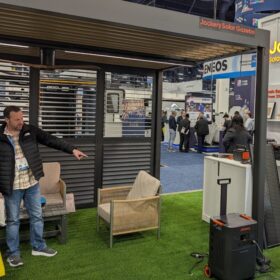How to build a balcony solar kit to UL certification
UL Solutions has released design standards for balcony solar, also known as plug-in pv, along with whitepaper highlighting three main risk categories of balcony solar in the US consumer market.
New Jersey governor boosts utility-scale solar, 3 GW of community solar, 750 MW of storage on day one
An executive order signed by the governor focused on energy generation, including speeding multiple forward focused on deploying solar power, and energy storage in the state.
BNEF sees 2026 solar slowdown with China slowing, the world growing
After peaking at 372 GW of solar deployed in China in 2025, BNEF sees a decline to 341 GW in 2026, leading to the first potential global slowdown in two decades, even as deployments outside China rise above 300 GW.
NineDot Energy enrolls 300 MW of community energy storage in New York
The New York Statewide Solar For All program aims to deliver $40 a month in bill savings via participating in distributed solar and energy storage programs across the state.
U.S. extends solar manufacturing tariff exclusions
The U.S. Trade Representative has extended the exclusion of 178 items from the Section 301 import tariffs that were put in place by the prior administration in 2024. The still standing tariffs include a 50% increase on solar cells
Crop prioritization, agrivoltaics, AI vs the data deluge, and an evolving tracker from Solargik
The racking manufacturer Solargik is learning how to maximize crop growth in Colorado, is integrating LLM tools to help users look deeper into data, and staying conscious of the interplay between energy prices, hardware costs, and interconnection.
Off-grid dual-axis solar tracker charges workplace EVs for under $0.10 per kWh
The Apollo system from Solaflect Energy uses a suspension-bridge-style racking design to cut weight while maximizing strength. With California’s high electricity prices and solar-friendly climate, the company sees the state’s commercial market as the ideal launchpad for its offgrid, dual-axis EV-charging tracker.
Illinois responds to OBBBA with 873 MW of solar, 3 GW of energy storage, VPPs, & more
The state is moving an energy bill through the legislature, that would – among other things – institute a 3 GW energy storage goal, create virtual power plant (VPP) and time of use plans, enact permitting reform, and more while concurrently reopening the solar program allowing it to more than double the year’s capacity goals.
Solar tariffs kill Americans
Researchers show how solar panel imports saved nearly 600 American lives over a decade, while industry data indicates that the Suniva solar tariff may have caused more than one hundred preventable deaths.
Why rooftop solar’s emissions math is changing
As clean energy grows, so do the limits of how it’s measured. A new Nature Climate Change study warns that rooftop solar’s emissions impact is shrinking as the grid cleans itself.















